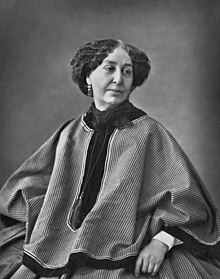You can help expand this article with text translated from the corresponding article in French. Click [show] for important translation instructions.
|
George Sand | |
|---|---|
 Portrait by Nadar (1864) | |
| Born | Amantine Lucile Aurore Dupin 1 July 1804 Paris, France |
| Died | 8 June 1876 (aged 71) Nohant-Vic, Berry, France |
| Occupation | Novelist |
| Movement | Pastoralism |
| Spouse | |
| Children | Maurice Sand Solange Dudevant |
| Parents |
|
Amantine Lucile Aurore Dupin de Francueil[1] (French: [amɑ̃tin lysil oʁɔʁ dypɛ̃]; 1 July 1804 – 8 June 1876), best known by her pen name George Sand (French: [ʒɔʁʒ(ə) sɑ̃d]), was a French novelist, memoirist and journalist.[2][3] Being more renowned than either Victor Hugo or Honoré de Balzac in England in the 1830s and 1840s,[4] Sand is recognised as one of the most notable writers of the European Romantic era. She has more than 50 volumes of various works to her credit, including tales, plays and political texts, alongside her 70 novels.
Like her great-grandmother, Louise Dupin, whom she admired, George Sand advocated for women's rights and passion, criticized the institution of marriage, and fought against the prejudices of a conservative society. She was considered scandalous because of her turbulent love life, her adoption of masculine clothing, and her masculine pseudonym.
- ^ Dupin's first Christian name is sometimes rendered as "Amandine".
- ^ Hart, Kathleen (2004). Revolution and Women's Autobiography in Nineteenth-century France. Rodopi. p. 91.
- ^ Lewis, Linda M. (2003). Germaine de Staël, George Sand, and the Victorian Woman Artist. University of Missouri Press. p. 48.
- ^ Thomson, Patricia (July 1972). "George Sand and English Reviewers: The First Twenty Years". Modern Language Review. 67 (3): 501–516. doi:10.2307/3726119. JSTOR 3726119.